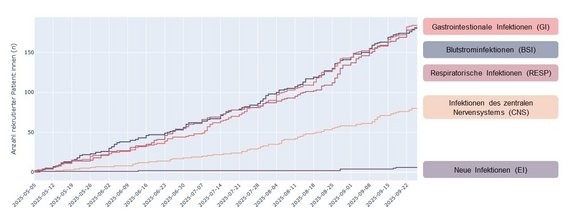How can infectious diseases be better understood and treated? The Specialist Network Infections (SNID), a specialised network within the NUM study network, is pursuing precisely this goal: better therapies through clinical studies. It is the first of many specialised networks to come and is part of the Network University Medicine (NUM).
Since its launch in 2024, 15 university hospitals from all over Germany have been participating in the specialist network for infections, 13 of which are already actively recruiting patients. So far, more than 600 people with various infectious diseases have been included in the so-called baseline cohort.
What is the basic cohort?
The baseline cohort systematically collects data and biosamples from patients with a wide range of acute infections. The special feature: the survey is standardised at all sites - this creates the conditions for comparable and high-quality research.
The basic cohort is divided into five subject areas:
- Gastrointestinal infections (GI)
- Bloodstream infections (BSI)
- Respiratory infections (RESP)
- Infections of the Central Nervous System (CNS)
- Emerging Infections (EI)
The modular structure makes it possible to investigate central medical issues in a targeted manner, to cover a broad spectrum of infectiological topics and, if necessary, to react flexibly to current developments, such as the emergence of new pathogens.
A strong network for the future
The Infectious Diseases Network is already demonstrating how successful cooperative, cross-site research can be in the future. With a high recruitment rate and intensive collaboration between the participating study centres, a promising path has been taken - with the aim of gaining a better understanding of infectious diseases and improving patient care in the long term.



